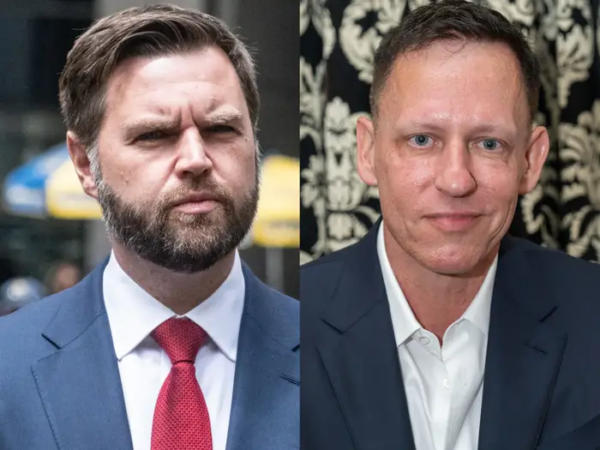Peter Thiel (R) plays kingmaker again as former president Donald Trump picks JD Vance for VP
Former President Donald Trump’s selection of Ohio GOP Sen. JD Vance to be his running mate shows one thing remains constant, even in a presidential race upended by an attempt to assassinate one candidate and doubts about whether the other is fit to run: money in presidential politics is still king.
Vance, a relative newcomer to national politics, has assiduously courted billionaires and Silicon Valley titans to bankroll his unlikely rise from bestselling memoirist of despair, drugs and generational poverty in Appalachia to a ticket that could seat him a heartbeat away from the presidency.
During his rapid rise, he has emerged as an ardent and effective defender of Trump, putting an intellectual gloss on the former president’s raw MAGA populism. But Vance may never have been in serious consideration for the No. 2 spot on the ticket had he not won elective office in a major Rust Belt state in the first place.
And big donors, particularly from the tech sector, provided the rocket fuel he needed to advance in electoral politics. Vance’s most prominent benefactor over the years is Peter Thiel, the iconoclastic tech pioneer and investor. Thiel hired Vance at his global investment firm in 2017, and then nurtured Vance’s political rise, donating $15 million to his 2022 Ohio Senate campaign and helping him win a closely fought GOP primary before going on to capture the seat in the general election.
Since then, Vance has received entrée to other tech mega-investors and was instrumental in organizing a $12 million fundraiser for Trump in June that included venture capitalists Chamath Paldihapitiya, an early senior executive at Facebook, and David Sacks, who was a key figure in developing Paypal, served as its COO and later founded the social networking service Yammer. Sacks previously chipped in $1 million of his personal fortune to a pro-Vance super PAC, according to FEC records.
But it’s the relationship with Thiel that has been the most consequential for Vance. Their personal and financial ties formed long before Vance formally entered politics.
At Yale Law, Vance attended a talk by Thiel about technological stagnation and the decline of American elites.
“He saw these two trends … as connected,” Vance later wrote about his first encounter with Thiel in a 2020 blog post in the Catholic journal The Lamp Magazine. “If technological innovation were actually driving real prosperity, our elites wouldn’t feel increasingly competitive with one another over a dwindling number of prestigious outcomes.” Vance called Thiel’s talk “the most significant moment” of his time at Yale.
After Yale Law and a short stint at a corporate law firm, Vance moved to San Francisco to work as a venture capitalist. Thiel hired him to join his tech fund, Mithril Capital — all while Vance continued to work on his memoir, “Hillbilly Elegy.”
In 2019 Vance moved back to his native Ohio, where he started his own venture capitalist firm, heavily backed by Thiel and other elite tech investors. By then he was flirting with a potential run for elective office, and Thiel was encouraging him. By the time Vance finally took the plunge in 2021, he had been transformed from one of Trump’s most vitriolic critics (he once called Trump “an American Hitler” in a private message to a friend) into one of his most effective defenders and fundraisers.
Thiel brought Vance to his very first meeting with Trump at Mar-a-Lago in February 2021, according to the New York Times.
In the 2022 campaign, Thiel made $15 million in donations to Vance’s SuperPAC, Protect Ohio Values, a staggering amount from a single individual for a Senate race, according to OpenSecrets, a nonpartisan group that tracks the influence of money on politics. But that wasn’t all. Thiel also steered at least $200,000 to Vance’s super PAC from a group he controlled called Per Aspera Policy, according to the Kansas City Star and OpenSecrets. Per Aspera is a dark money nonprofit, which means that its spending is used to influence elections, but it is not required to disclose its donors. In the same cycle, Vance’s super PAC also received hundreds of thousands in contributions from the Mercer, Uihlein and Lindner families, all staples of mega-conservative political giving in recent years.
It is not entirely clear what Thiel may have wanted in exchange for his largesse. (Thiel declined comment for this story.) Thiel’s philosophy has been described as “techno-libertarian,” but critics say it veers toward authoritarianism, and even fascism (he wrote in an article in a libertarian journal in 2009, “I no longer believe that freedom and democracy are compatible”).
A co-founder of PayPal and Palantir Technologies, and an early investor in Facebook, Thiel also has business interests with the U.S. government, which may be especially important at a time when the tech sector is under intense scrutiny from both Democrats and Republicans. Whether his goals are ideological or financial, government watchdogs are watching closely.
“We’ve seen this long history of financial entanglements between Thiel and Vance,” said Anna Massoglia, editorial and investigations manager at OpenSecrets. “Thiel’s interests in having Vance in office are not explicit, but there’s no question he has business interests that could be benefited by having someone like JD Vance in his corner.”
There are at least some indications that Thiel’s political generosity has translated into influence. In 2016, Thiel helped bail out Trump financially at a time when he most needed it: after the release of the “Access Hollywood” tape. He gave $1.25 million, and shortly after Trump’s 2016 victory, Thiel was given an office at Trump Tower where he recommended candidates for jobs in the incoming administration, according to The Atlantic’s Barton Gellman. In short order, two close associates of Thiel’s won plum positions in the Trump administration. One was tapped to be chief technology officer; another was named to the senior staff of the National Security Council.
But after years of handing tens of millions to Vance, Trump and other Republicans, Thiel told Gellman that he’s not giving to any politician in 2024. In his view, they failed to make the changes he hoped to see, and he now thinks it matters little who’s in power. In April, Trump called him to ask for $10 million. Thiel said in the Atlantic interview that he turned him down, and Trump told him he was “very sad, very sad to hear that.”
Israeli links

Peter Thiel, co-founder and chairman of Palantir Technologies Inc., speaks during a news conference in Tokyo, Japan, on Monday, Nov. 18, 2019.
Thiel is the co-founder and chairman of Palantir, which is known for its government contract work in defense and intelligence,
It has provided its technology to support the Ukrainian and Israeli militaries in their respective wars. Israel has vowed to defeat Hamas following the Palestinian militant group’s rampage on Oct. 7 in southern Israel that killed nearly 1,139 people. More than 38,700 people have been killed in Gaza since the war began, according to the Hamas-run Health Ministry there.
Palantir’s CEO Alex Karp was quoted last February as saying “ I am exceedingly proud that after Oct. 7, within weeks, we are on the ground and we are involved in operationally crucial operations in Israel.”
Palantir held its first board meeting of the year in Tel Aviv, Israel, in January, after which the company agreed to a “strategic partnership” with the Israeli Ministry of Defense to supply the country with technology for its military efforts.

Palantir CEO Alex Karp, center, with the head of Israel’s Directorate of Defense Research & Development Daniel Gold, center right, and Palantir co-founder and Chairman Peter Thiel, second right Source: Palantir Technologies Inc.
Last March , Palantir secured a $178.4 million contract with the U.S. Army to develop 10 artificial intelligence-powered ground stations, part of a project called Tactical Intelligence Targeting Access Node, or TITAN.
NBC/ News Agencies


Leave a Reply
You must be logged in to post a comment.